Assuredly, the word of truth can be painful and uncomfortable. But it is the way to holiness, to peace, and to inner freedom. A pastoral approach which truly wants to help the people concerned must always be grounded in the truth. In the end, only the truth can be pastoral.
Distinction Matter - Subscribed Feeds
-
Site: RT - News
Berlin has so far refused to provide Kiev with Taurus cruise missiles
European countries intend to create yet another “capability coalition” to supply Ukrainian forces with long-range weapons, German Chancellor Olaf Scholz said on Friday, echoing an initiative floated by French President Emmanuel Macron.
During a joint press conference with Macron and Polish Prime Minister Donald Tusk in Berlin on Friday, the German chancellor stated that the countries have agreed to expand their own production of military equipment and “procure even more weapons for Ukraine, on the overall world market.”
“We are establishing a new capability coalition for long-range rocket artillery,” Scholz told journalists. The German leader provided no specifics and took no questions, so it remains unclear whether he meant something new, or was referring to a “long-range” initiative announced by Macron last month.
Read more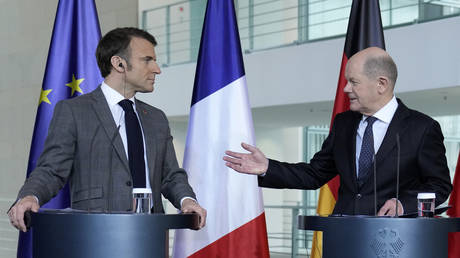 ‘We’re not at war with Russia,’ Scholz tells Macron
‘We’re not at war with Russia,’ Scholz tells Macron
Following a summit of Ukraine’s backers in Paris, Macron said that France would lead a new coalition that aims to provide Kiev with “medium and long-range missiles and bombs.” Much like many previous Western “capability coalitions” focused on drones, artillery, air defenses and others, the new group seeks to unite those who want to boost Ukraine’s specific ability to “carry out deep strikes,” the French leader said at the time.
It remains unclear what new types of weapons Kiev’s foreign sponsors could supply, as the UK and France have already been providing their Storm Shadow and SCALP-EG long-range cruise missiles since last year, with Macron pledging another 40 missiles in January. The US also sent some of its ATACMS missiles, but Kiev has already depleted the limited supply, and has repeatedly called for additional weapons amid the suspension of American aid.
Read more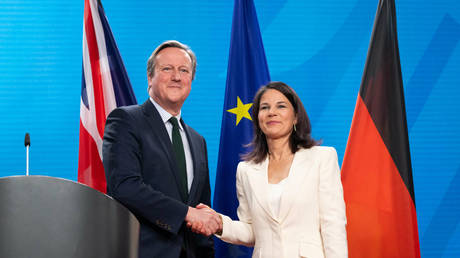 UK pressures Germany on long-range missiles for Ukraine
UK pressures Germany on long-range missiles for Ukraine
Scholz has so far refused to send German-made Taurus missiles to Ukraine in order to avoid the risk of a direct conflict with Russia, resisting pressure from foreign partners and some politicians at home.
On Wednesday, Scholz again insisted that the delivery of Taurus missiles was “a line that I don’t want to cross as chancellor.” He explained that such a shipment would inevitably require the presence of German military personnel on Ukrainian soil – a development that is “out of the question.”
-
Site: RT - News
Finland’s foreign minister has argued that nobody knows how “serious” the conflict could become
Finland agrees with France that all options must remain on the table to support Kiev's war effort against Moscow – but at this stage Helsinki is not willing to send its own troops to Ukraine or even discuss such a possibility, according to Foreign Minister Elina Valtonen.
French President Emmanuel Macron provoked a backlash in February when he suggested that the US-led military bloc “cannot exclude” the possibility of sending NATO soldiers to help Ukraine. Several member states, including Finland’s then-president, quickly repudiated Macron’s remarks – asserting that they would not put boots on the ground in Ukraine.
However, the Finnish foreign minister argued that all options should be considered if the situation deteriorates for Ukraine, Politico’s National Security Daily newsletter reported on Friday.
READ MORE: Western troops in Ukraine: How a big lie could lead to the biggest war
“It’s important that we not rule everything out for the long term, because we never know how serious the situation becomes,” Valtonen said.
But the Finnish position is clear: We are not right now sending any troops and not willing to discuss that.
In the meantime, Western backers “could do so much more” to arm Kiev, Valtonen argued. She criticized Washington for dragging its feet on new aid, saying its reputation was at stake.
Finland, which joined NATO last April, has been spending more than the alliance's target of 2% of GDP on its military – and more than 0.6% of GDP on Ukraine.
Read more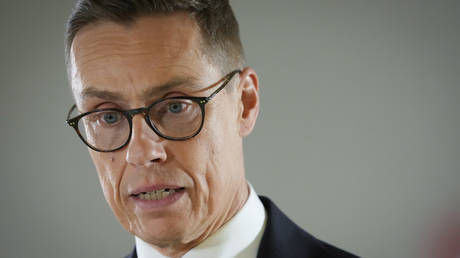 Finland’s new president hails American nuclear weapons
Finland’s new president hails American nuclear weapons
Finland shares a 1,300 kilometer border with Russia, and Moscow has argued that NATO membership has threatened, not guaranteed, Finnish security. After Finland joined the bloc last year, Russian President Vladimir Putin announced the creation of a new military district bordering the Nordic nation. “There was no trouble” before Finland joined the bloc, he said in December, adding: “now there will be.”
Finland’s newly elected president Alexander Stubb promised at his inauguration to lead the Nordic nation into a “new era” of military partnership with the West, boasting that NATO membership gives his country a “real nuclear deterrent” in the form of American missiles.
-
Site: RT - News
By providing military aid to Kiev, the US has strained its own arsenals; the Congressionally approved money pot has run dry
The US Defense Department has asked the nation's Congress to allocate at least $6.5 billion to replenish its stocks, which have been depleted after two years of constant weapon deliveries to Ukraine, according to a document seen by Bloomberg.
The Pentagon alerted Congress that spending on replenishment was a high priority in the proposals it submitted last month, the outlet reported on Thursday.
The shopping list reportedly includes a wide range of weapons, ammunition and critical components for the production of 155mm shells, HARM anti-radar missiles, Patriot interceptors, GMLRS rockets and anti-tank TOWs.
While the Pentagon estimated the price of its immediate replenishment needs at $6.5 billion, multiple US media reports suggested earlier this week that the total deficit could be at least $10 billion. Unless the shortfall is compensated, the “ongoing hole” will put a strain on the US military, one source told Politico.
READ MORE: Ukraine’s ammo shortage hurting US strategy – White House
Washington had provided more than $75 billion in cash and equipment for Ukraine’s war effort by the end of last year, far surpassing other Western donors, but the deliveries stopped after the Congressionally approved money pot ran dry.
Read more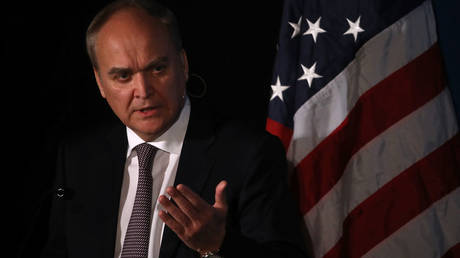 Russia accuses US of ‘direct involvement’ in Ukraine conflict
Russia accuses US of ‘direct involvement’ in Ukraine conflict
The White House has requested over $60 billion in supplemental Ukraine assistance, but the Republican-controlled House has stonewalled repeated calls by US President Joe Biden to release the money. Biden has blamed US lawmakers for Kiev’s recent battlefield losses, including last month’s fall of Avdeevka to Russian forces.
Despite running out of money, the White House has found enough “unanticipated savings” at the Pentagon to announce a new aid package valued at up to $300 million this week. The Pentagon still has the authority to send some $4 billion worth of aid to Ukraine, but Defense Secretary Lloyd Austin has so far been reluctant to tap into that fund, with no assurances the money will be replaced by US lawmakers.
-
Site: RT - News
No ‘lasting peace’ is possible without Ukraine gaining control of the Russian peninsula, the French president has claimed
Ukraine must regain control over all the territories it once held, including Russia’s Crimean Peninsula, French President Emmanuel Macron has said. Otherwise, no “lasting peace” will be possible, he claimed.
The president made the remarks on Thursday in an interview with broadcasters TF2 and France 2, bluntly describing Russia as France’s “adversary.” At the same time, he insisted that Paris has not been “waging war on Russia” but merely “supporting” Kiev in the conflict.
“Certainly, today, Russia is an adversary. The Kremlin regime is an adversary,” Macron stated. “We are doing everything so that it can put Russia in check because, I will tell you very simply, there is no lasting peace if there is no sovereignty, a return to the internationally recognized borders of Ukraine, including Crimea.”
The latest remarks by the French president got a cold reception in Russia, with Kremlin spokesman Dmitry Peskov stating that Macron apparently “won’t mind increasing the degree of his involvement” in Russia-Ukraine hostilities.
“Yes, it’s obvious that Russia is an adversary of France because France is already involved in the war in Ukraine; it is indirectly taking part in this war,” Peskov told reporters.
Read more ‘We’re not at war with Russia,’ Scholz tells Macron
‘We’re not at war with Russia,’ Scholz tells Macron
The French president has produced increasingly belligerent statements lately, standing by the remarks he made late in February, that a potential deployment of NATO troops into Ukraine cannot be “excluded.” The remarks prompted a wave of denial from fellow members of the US-led bloc. In this latest interview, Macron refused to elaborate on the matter, claiming he wanted to maintain “strategic ambiguity” and that he has “reasons not to be precise.”
Macron’s remarks echo the position repeatedly voiced by the top Ukrainian leadership, which proclaimed the goal of seizing from Russia all the territories that ended up being held by Kiev following the collapse of the Soviet Union.
Crimea broke away from Ukraine in the aftermath of the 2014 Maidan coup in Kiev, promptly rejoining Russia after a peninsula-wide referendum. The Donetsk and Lugansk People’s Republics emerged this year as well, with the botched attempt of Kiev’s new authorities to suppress them by force resulting in years-long conflict in then-Ukrainian Donbass.
The two republics, as well as the formerly Ukrainian Zaporozhye and Kherson regions, were incorporated into Russia in late 2022 after the idea was overwhelmingly backed by locals in referendums separately held in each territory. Moscow has repeatedly signaled that its sovereignty over Crimea and any other Russian territories is not a subject to negotiation with anyone.
-
Site: RT - News
The social media influencing campaign was intended to foster ‘paranoia’ among top leaders in Beijing, Reuters reported
Former US President Donald Trump authorized a secret CIA influence campaign aimed at smearing the Chinese government and turning public opinion against its leaders, Reuters reported on Thursday, citing ex-officials with knowledge of the operation.
According to the report, the CIA formed a team of operatives in 2019 who used fake internet identities to spread “negative narratives” about President Xi Jinping’s government and leak “disparaging intelligence” to foreign news outlets.
Among the narratives spread by the CIA on Chinese social media platforms were allegations that members of the ruling Communist Party were hiding money overseas. The Belt and Road Initiative, China’s global infrastructure development strategy, was also framed as “corrupt and wasteful.”
The US officials who spoke to Reuters said the effort by the Trump administration was intended to “foment paranoia among top leaders” and force the government in Beijing to expend resources chasing up intrusions into its internet space.
“We wanted them chasing ghosts,” one former official said. The sources described the operation as an American response to “years of aggressive covert efforts by China aimed at increasing its global influence.”
Read more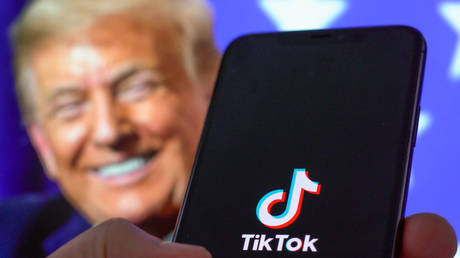 Trump comments on why he didn’t ban TikTok
Trump comments on why he didn’t ban TikTok
A CIA spokesperson contacted by Reuters declined to comment on the existence of the program.
A spokesperson for China’s Ministry of Foreign Affairs told the outlet that the revelation proved that Washington uses public platforms “as weapons to spread false information and manipulate international public opinion.”
During his time in office, Trump orchestrated a shift in US foreign policy from the Middle East to China, with the Pentagon branding China as Washington’s top “strategic competitor” in its 2018 National Defense Strategy. Trump also waged a large-scale trade war against Beijing for much of his term.
In 2020, the president also tried to block access to the Chinese-owned TikTok platform through an executive order, arguing that it was a threat to national security.
Amid recently renewed efforts by Congress to ban the app, Trump, now the 2024 the Republican presidential frontrunner, told CNBC this week that he chose to back away from efforts to ban the platform due to its popularity among young Americans and concerns that it would strengthen rival social media giant Facebook, which he described as “an enemy of the people.”
READ MORE: Ex-US Treasury Secretary reveals TikTok purchase plans
On Wednesday, the House of Representatives voted to force the platform’s Chinese owner ByteDance to sell the app within six months or face a US ban – and on Friday, former US Treasury Secretary Steven Mnuchin said he was building an investor group to buy TikTok.
Reuters said it was unable to determine what impact the secret CIA operation had in China or whether President Joe Biden’s administration has maintained it.
-
Site: RT - News
The incident occurred off the Russian exclave of Kaliningrad, with media reports blaming the interference on Moscow
The UK Ministry of Defence has publicly expressed concerns after a RAF plane with Defence Secretary Grant Shapps was subjected to GPS jamming while flying near the Russian exclave of Kaliningrad. While London did not explicitly assign blame for the incident, British media reports are claiming Moscow was behind it.
The incident was publicized by the ministry on Thursday, with a spokesperson revealing the electronic interference had occurred while Shapps was traveling back to the UK from Poland on Wednesday.
“The plane carrying the defence secretary and his delegation temporarily experienced GPS jamming when they flew close to Kaliningrad,” the spokesperson said.
“It didn’t threaten the safety of the aircraft and it is not unusual for aircraft to experience GPS jamming near Kaliningrad, which is, of course, Russian territory,” the official added.
While the ministry did not overtly attach any blame for the incident on Russia, government sources told the British media that this was likely the case. No actual evidence to back up such allegations, however, has been presented.
Read more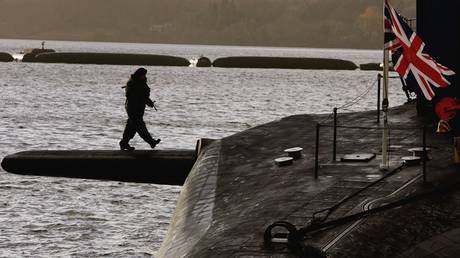 British nuclear submarine test fails
British nuclear submarine test fails
“While the RAF are well prepared to deal with this, it still puts an unnecessary risk on civilian aircraft and could potentially endanger people’s lives. There is no excuse for this, and it’s wildly irresponsible on Russia’s part,” an unnamed defense source told The Times.
Over the past few weeks, GPS connectivity issues have been repeatedly been reported in the vicinity of Kaliningrad, including in Poland as well as in the wider Baltic region, with the issue reaching southern Swedish and northeastern German regions.
While multiple media reports attributed the interference to Russian electronic warfare jammers allegedly getting activated in Kaliningrad, the troubles also correspond with the ongoing military maneuvers of the US-led NATO bloc in the area, said to be the largest exercise staged since the end of the Cold War era. Neither of the suspected parties who might have been causing the GPS interference has provided any public comment on the matter.
-
Site: RT - News
Macron’s latest sallies and the spat they’ve caused show that Western Europe must finally be honest about the causes of the Ukraine conflict
The current situation in the conflict between Ukraine – serving (while being demolished) as a proxy for the West – and Russia, can be sketched in three broad strokes.
First, Russia now clearly has the upper hand on the battlefield and could potentially accelerate its recent advances to achieve an overall military victory soon. The West is being compelled to recognize this fact: as Foreign Affairs put it, in an article titled “Time is Running Out in Ukraine,” Kiev and its Western supporters “are at a critical decision point and face a fundamental question: How can further Russian advances… be stopped, and then reversed?” Just disregard the bit of wishful thinking thrown in at the end to sweeten the bitter pill of reality. The key point is the acknowledgment that it is crunch time for the West and Ukraine – in a bad way.
Second, notwithstanding the above, Ukraine is not yet ready to ask for negotiations to end the war on terms acceptable to Russia, which would be less than easy for Kiev. (Russian President Vladimir Putin, meanwhile, reiterated in an important recent interview that Moscow remains principally open to talks, not on the basis of “wishful thinking” but, instead, proceeding from the realities “on the ground.”)
The Kiev regime’s inflexibility is little wonder. Since he jettisoned a virtually complete – and favorable – peace deal in the spring of 2022, President Vladimir Zelensky has gambled everything on an always improbable victory. For him personally, as well as his core team (at least), there is no way to survive – politically or physically – the catastrophic defeat they have brought on their country by leasing it out as a pawn to the Washington neocon strategy.
The Pope, despite the phony brouhaha he triggered in Kiev and the West, was right: a responsible Ukrainian leadership ought to negotiate. But that’s not the leadership Ukraine has. Not yet at least.
Third, the West’s strategy is getting harder to decipher because, in essence, the West cannot figure out how to adjust to the failure of its initial plans for this war. Russia has not been isolated; its military has become stronger, not weaker – and the same is true of its economy, including its arms industry.
Read more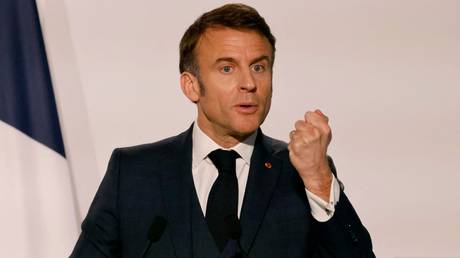 Kremlin responds to Macron’s claim Russia an ‘adversary’
Kremlin responds to Macron’s claim Russia an ‘adversary’
And last but not least, the Russian political system’s popular legitimacy and effective control has neither collapsed nor even frayed. As, again, even Foreign Affairs admits, “Putin would likely win a fair election in 2024.” That’s more than could be said for, say, Joe Biden, Rishi Sunak, Olaf Scholz, or Emmanuel Macron (as for Zelensky, he has simply canceled the election).
In other words, the West is facing not only Ukraine’s probable defeat, but also its own strategic failure. The situation, while not a direct military rout (as in Afghanistan in 2021) amounts to a severe political setback.
In fact, this looming Western failure is a historic debacle in the making. Unlike with Afghanistan, the West will not be able to simply walk away from the mess it has made in Ukraine. This time, the geopolitical blowback will be fierce and the costs very high. Instead of isolating Russia, the West has isolated itself, and by losing, it will show itself weakened.
It is one thing to have to finally, belatedly accepted that the deceptive “unipolar” moment of the 1990s has been over for a long time. It is much worse to gratuitously enter the new multipolar order with a stunning, avoidable self-demotion. Yet that is what the EU/NATO-West has managed to fabricate from its needless over-extension in Ukraine. Hubris there has been galore, the fall now is only a matter of time – and not much time at that.
Regarding EU-Europe in particular, on one thing French President Emmanuel Macron is half right. Russia’s victory “would reduce Europe’s credibility to zero.” Except, of course, a mind of greater Cartesian precision would have detected that Moscow’s victory will merely be the last stage in a longer process.
The deeper causes of EU/NATO-Europe’s loss of global standing are threefold. First, its own wanton decision to seek confrontation instead of a clearly feasible compromise and cooperation with Russia (why exactly is a neutral Ukraine impossible to live with again?) Second, the American strategy of systematically diminishing EU/NATO-Europe with a short-sighted policy of late-imperial client cannibalization which takes the shape of aggressive deindustrialization and a “Europeanization” of the war in Ukraine. And third, the European clients’ grotesque acquiescence to the above.
Read more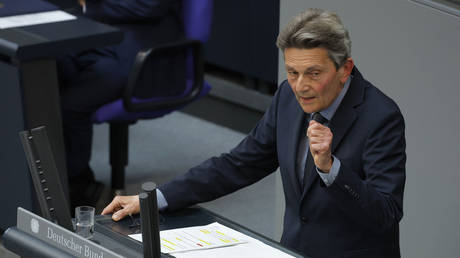 Top German government MP calls for end to Ukraine conflict
Top German government MP calls for end to Ukraine conflict
That is the background to a recent wave of mystifying signals coming out of Western, especially EU/NATO elites: First, we have had a wave of scare propaganda to accompany the biggest NATO maneuvers since the end of the Cold War. Next Macron publicly declared and has kept reiterating that the open – not in covert-but-obvious mode, as now – deployment of Western ground troops in Ukraine is an option. He added a cheap demagogic note by calling on Europeans not to be “cowards,” by which he means that they should be ready to follow, in effect, his orders and fight Russia, clearly including inside and on behalf of Ukraine. Never mind that the latter is a not an official member of either NATO or the EU as well as a highly corrupt and anything but democratic state.
In response, a divergence has surfaced inside EU/NATO Europe: The German government has been most outspoken in contradicting Macron. Not only Chancellor Scholz rushed to distance himself. A clearly outraged Boris Pistorius – Berlin’s hapless minister of defense, recently tripped up by his own generals’ stupendously careless indiscretion over the Taurus missiles – has grumbled that there is no need for “talk about boots on the ground or having more courage or less courage.” Perhaps more surprisingly, Poland, the Czech Republic as well as NATO figurehead Jens Stoltenberg (i.e., the US) have been quick to state that they are, in effect, not ready to support Macron’s initiative. The French public, by the way, is not showing any enthusiasm for a Napoleonic escalation either. A Le Figaro poll shows 68 percent against openly sending ground troops to Ukraine.
On the other side, Macron has found some support. He is not entirely isolated, which helps explain why he has dug in his heels: Zelensky does not count in this respect. His bias is obvious, and his usual delusions notwithstanding he is not calling the shots on the matter. The Baltic states, however, while military micro-dwarfs, are, unfortunately, in a position to exert some influence inside the EU and NATO. And true to form, they have sided with the French president, with Estonia and Lithuania taking the lead.
It remains impossible to be certain what we are looking at. To get the most far-fetched hypothesis out of the way first: is this a coordinated bluff with a twist? A complicated Western attempt at playing good-cop bad-cop against Russia, with Macron launching the threats and others signaling that Moscow could find them less extreme, at a diplomatic price, of course? Hardly. For one thing, that scheme would be so hare-brained, even the current West is unlikely to try. No, the crack opening up in Western unity is real.
Regarding Macron himself, too-clever-by-half, counter-productive cunning is his style. We cannot know what exactly he is trying to do; and he may not know himself. In essence, there are two possibilities. Either the French president now is a hard-core escalationist determined to widen the war into an open clash between Russia and NATO, or he is a high-risk gambler who is engaged in a bluff to achieve three purposes. Frighten Moscow into abstaining from pushing its military advantage in Ukraine (a hopeless idea); score nationalist “grandeur” points domestically in France (which is failing already); and increase his weight inside EU/NATO-Europe by “merely” posturing as, once again, a new “Churchill” – whom Macron himself has made sure to allude to, in all his modesty. (And some of his fans, including Zelensky, a grizzled veteran of Churchill live action role play, have already made that de rigueur if stale comparison.)
While we cannot entirely unriddle the moody sphinx of the Elysée or, for that matter, the murky dealings of EU/NATO-European elites, we can say two things. First, whatever Macron thinks he is doing, it is extremely dangerous. Russia would treat EU/NATO-state troops in Ukraine as targets – and it won’t matter one wit if they turn up labeled “NATO” or under national flags “only.” Russia has also reiterated that it considers its vital interests affected in Ukraine and that if its leadership perceives a vital threat to Russia, nuclear weapons are an option. The warning could not be clearer.
Read more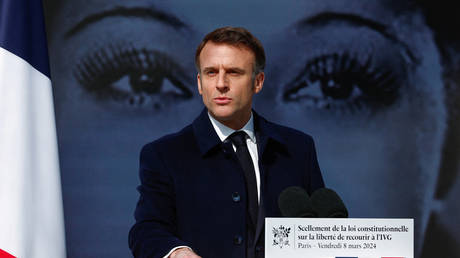 Macron leads the way to Western civilization’s suicide
Macron leads the way to Western civilization’s suicide
Second, here is the core Western problem that is now – due to Russia undeniably winning the war – becoming acute: Western elites are split between “pragmatists” and “extremists.” The pragmatists are as Russophobic and strategically misguided as the extremists, but they do shy away from World War Three. Yet these pragmatists, who seek to resist hard-core escalationists and reign it at least high-risk gamblers, are brought up short against a crippling contradiction in their own position and messaging: As of now, they still share the same delusional narrative with the extremists. Both groupings keep reiterating that Russia plans to attack all of EU/NATO-Europe once it defeats Ukraine and that, therefore, stopping Russia in Ukraine is, literally, vital (or in Macron’s somewhat Sartrean terms “existential”) to the West.
That narrative is absurd. Reality works exactly the other way around: The most certain way to get into a war with Russia is to send troops to Ukraine openly. And what is existential for EU/NATO-Europe is to finally liberate itself from American “leadership.” During the Cold War, a case could be made that (then Western) Europe needed the US. After the Cold War, though, that was no longer the case. In response, Washington has implemented a consistent, multi-administration, bipartisan, if often crude, strategy of avoiding what should have been inevitable: the emancipation of Europe from American dominance.
Both the eastward expansion of NATO, programmed – and predicted – to cause a massive conflict with Russia and the current proxy war in Ukraine, obstinately provoked by Washington over decades, are part of that strategy to – to paraphrase a famous saying about NATO – “keep Europe down.” And the European elites have played along as if there’s no tomorrow, which, for them, there really may not be.
We are at a potential breaking-point, a crisis of that long-term trajectory. If the pragmatists in EU/NATO-Europe really want to contain the extremists, who play with triggering an open war between Russia and NATO that would devastate at least Europe, then they must now come clean and, finally, abandon the common, ideological, and entirely unrealistic narrative about an existential threat from Moscow.
As long as the pragmatists dare not challenge the escalationists on how to principally understand the causes of the current catastrophe, the extremists will always have the advantage of consistency: Their policies are foolish, wastefully unnecessary, and extremely risky. And yet, they follow from what the West has made itself believe. It is high time to break that spell of self-hypnosis, and face facts.
-
Site: RT - News
French leader has promised to incorporate ‘consent’ into new legislation on sexual assault, having opposed its inclusion in EU directive
The President of France Emmanuel Macron has come under fire after saying he was in favor of incorporating the notion that a sexual act without consent should fall under the country’s criminal definition of rape.
The statement came as a surprise for the public, given that Paris had opposed the same idea in a European Union (EU) directive last month.
Macron’s statement was made on March 8, when he met members of the feminist association Choisir la cause des femmes (Choosing Women’s Issues), to mark International Women’s Day.
According to a video seen by AFP this week, the French president told the women’s rights group: “I fully agree that it should be incorporated into French law, that consent should be enshrined,” adding “I’m going to enshrine it in French law.”
The legal definition of rape in France includes the notions of “violence, coercion, threat or surprise,” but makes no mention of “consent.” Women’s rights advocates have been calling for the law to be tightened by including the concept so that any sexual act without consent constitutes rape. Only a tiny fraction of rapes or attempted rapes lead to a conviction, they claim.
Meanwhile, Macron’s comments sparked public backlash since they are in total contradiction to France’s official stance on the issue. France was one of several countries to argue against including a consent-based definition of rape in EU law passed last month. The states in opposition, including Hungary, Germany, Poland, and the Netherlands, argued that rape does not have the cross-border dimension necessary for it to be considered a crime that comes with common penalties across the bloc.
Macron stated in the March 8 video that he did not believe rape was a “Eurocrime,” but that he did want to change French law.
Read more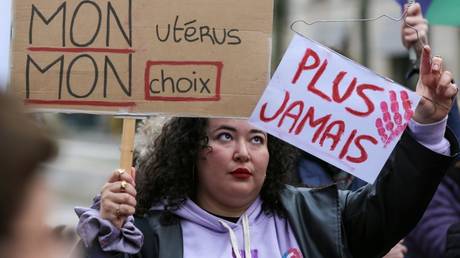 France enshrines abortion in its constitution
France enshrines abortion in its constitution
“We fought for two years to convince France of the importance of adopting this European definition of rape” according to which a sexual act without consent is rape, MEP Nathalie Colin-Oesterle (EPP), her group’s rapporteur on the EU directive, told Euractiv.
“For months, [French Justice Minister] Eric Dupond-Moretti has been explaining to us … that incorporating the notion of consent into the Criminal Code would be absolutely counterproductive and dangerous for women victims, since it would place the burden of proof on them.”
“What an instrumentalization of the cause of women, just a few weeks before the European elections!” Colin-Oesterle concluded.
A group of French lawmakers is currently working on a report on whether to add ‘consent’ to the law that they are to present in mid-April, according to media.
Last year, Spain approved new legislation, dubbed the ‘Only yes means yes’ law, under which all non-consensual sex is seen as rape. Sweden, Denmark, Finland and Greece have all passed similar laws.
-
Site: RT - News
Steven Mnuchin told CNBC he is putting together an investor group to try to buy the short-video app
Former US Treasury Secretary Steven Mnuchin has said he is building an investor group to acquire TikTok, a day after the House of Representatives voted to force the social media platform’s Chinese owner ByteDance to sell the app or face a US ban.
The House passed the legislation by a vote of 352-65 on Wednesday, citing national-security risks. The bill now goes to the Senate. US President Joe Biden previously said he would sign the bill into law if it passes both houses of Congress.
“I think the legislation should pass and I think [TikTok] should be sold,” Mnuchin, who leads Liberty Strategic Capital, told CNBC on Thursday. “It’s a great business and I’m going to put together a group to buy TikTok,” he stated.
Mnuchin, who served as Treasury Secretary under former President Donald Trump, did not specify who the other investors would be in such a deal or the potential valuation for the social media site.
“This should be owned by US businesses,” he stressed, adding “There’s no way that the Chinese would ever let a US company own something like this in China.”
Read more Beijing slams proposed US TikTok ban as ‘bandit logic’
Beijing slams proposed US TikTok ban as ‘bandit logic’
Meanwhile, the Wall Street Journal had earlier reported that former Activision Blizzard CEO Bobby Kotick was also shopping a potential deal to prospective partners. However, according to CNBC, it remains unclear whether the Chinese government would permit ByteDance to sell TikTok to a US buyer.
China has lashed out at an ongoing effort to ban the popular social media platform in the US, with Foreign Ministry spokesman Wang Wenbin saying that such a step would violate international trade rules. TikTok CEO Shou Zi Chew has implied that a sale is not an option.
While TikTok is the only application specifically mentioned in the document currently winding its way through Congress, it creates a framework for Washington to ban other platforms controlled by countries it considers “foreign adversaries,” experts warn. The list of nations labeled as such includes China, Russia, Iran, North Korea and Venezuela.
If inked into law, the bill would give ByteDance 165 days to divest TikTok, which has more than 170 million American users. If it fails to do so, US web-hosting companies would have to remove TikTok and other apps linked to ByteDance from their app stores.
-
Site: RT - News
France seemingly wants to increase its involvement in the Ukraine conflict, spokesman Dmitry Peskov has said
French President Emmanuel Macron is right to call Moscow an “adversary” because Paris is already indirectly involved in the conflict between Russia and Ukraine, Kremlin spokesman Dmitry Peskov has said.
In an interview with the TF1 and France 2 channels on Thursday, Macron insisted that France is “not waging war on Russia” by supporting Kiev, but stated that his government is doing its utmost to ensure a Ukrainian victory. He described Moscow as an “adversary” of France, but declined to brand it an “enemy.”
Responding on Friday, Peskov said Russian authorities have been following the recent rhetoric by the French leader.
“Yes, it’s obvious that Russia is an adversary of France because France is already involved in the war in Ukraine; it is indirectly taking part in this war,” Peskov told reporters.
“But, judging by the [French] president’s statement, he won’t mind increasing the degree of his involvement [in the conflict],” the Kremlin spokesman added.
Read more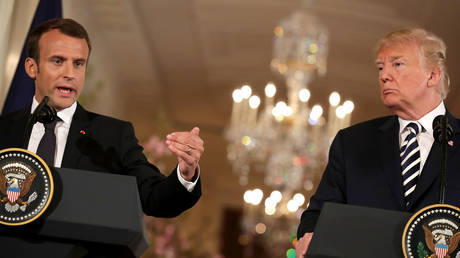 Russia ‘an adversary’ – Macron
Russia ‘an adversary’ – Macron
Macron was asked during his interview with French TV to clarify his recent remarks about the possibility of deploying Western troops to Ukraine. The comments prompted a wave of denials from the leaders of fellow NATO member states, who insisted there are no such plans.
Macron refused to offer any specifics on Thursday, however, claiming he wants to maintain “strategic ambiguity” and that he has “reasons not to be precise.”
He insisted that France will not launch an offensive against Moscow, but added that “if the situation should deteriorate [for Ukraine], we would be ready to make sure that Russia never wins that war.”
Macron also claimed that anyone in the EU calling for “limits” on aid to Ukraine is “choosing defeat,” and that victory for Russia “would reduce Europe’s credibility to zero.”
France has provided Ukraine with €3.8 billion ($4.1 billion) worth of assistance since the conflict with Russia began in February 2022. Deliveries of lethal aid have induced Caesar self-propelled guns, SCALP long-range missiles, and other hardware.
Russian President Vladimir Putin stressed during an interview with national media on Wednesday that Moscow would treat troops from the US or other NATO countries as “interventionists” if they are deployed to Ukraine, and would respond accordingly.
READ MORE: Putin issues warning on US troops in Ukraine
Western servicemen are already present in Ukraine “both directly and in the form of advisers, they are present in the form of foreign mercenaries and are suffering losses,” the Russian leader said. The battlefield situation will not change even if this escalates to official foreign military contingents, Putin insisted.
-
Site: RT - News
Benjamin Netanyahu said the IDF is prepared to conduct the attack and evacuate the civilian population
Israeli Prime Minister Benjamin Netanyahu has rejected the latest truce and prisoner-exchange proposal by Hamas and has approved an IDF plan to launch an operation in the southern Gaza city of Rafah, Israeli media reported on Friday.
”The IDF is prepared for the operation and to evacuate the [civilian] population,” the PM’s office said in a statement, as cited by the Times of Israel.
Earlier in the day, Hamas announced on social media that it had presented its “vision” of a prisoner swap with Israel to Qatari and Egyptian mediators and was looking towards a ceasefire agreement which would involve the withdrawal of Israel Defense Forces from Gaza.
Read more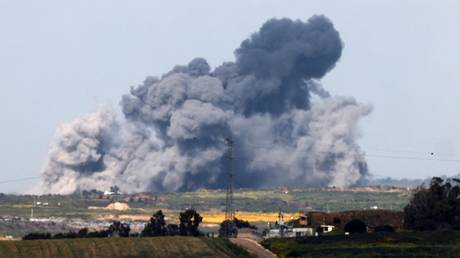 Hamas issues terms for permanent ceasefire with Israel – Reuters
Hamas issues terms for permanent ceasefire with Israel – Reuters
As reported by Reuters, which has seen the proposal, the Palestinian militants proposed the release of Israeli women, including female soldiers, children, the elderly and ill hostages, in exchange for Israel freeing between 700 and 1,000 Palestinian prisoners. Once the prisoner exchange is complete, Hamas said it would be ready to negotiate a date for a permanent ceasefire.
The Jewish state, however, dismissed the proposal and accused Hamas of making “unrealistic demands.”
On Thursday, Netanyahu also reiterated Israel’s determination to complete its mission of “eliminating” Hamas.
Israel’s decision to proceed with a ground incursion into Rafah comes after repeated warnings from the international community, including the US and Egypt, not to enter the city where some 1.5 million Palestinians are currently sheltering.
After Hamas militants launched a surprise attack on Israeli settlements last October 7, which saw 1,100 people killed and 250 taken hostage, Israel has been conducting a relentless siege on Gaza. According to the latest information from Palestinian health authorities, at least 31,341 people have been killed and 73,134 others injured in Israeli airstrikes and ground operations in the enclave over the past half a year.
-
Site: RT - News
Washington’s envoy accused Viktor Orban’s government of jeopardizing relations
Hungarian Prime Minister Viktor Orban is isolating his country from the Western “community of democracies,” US Ambassador David Pressman claimed on Thursday in wide-reaching rebuke.
Ties between the two nations should not depend on “temporary” leaders, the diplomat argued, as he delivered a list of grievances against Budapest.
“While the Orban government may want to wait out the United States government, the United States will certainly not wait out the Orban administration. While Hungry waits, we will act,” Pressman warned.
The ambassador was referring to Orban’s expressed hope that Donald Trump will defeat President Joe Biden in the upcoming presidential election.
Pressman’s speech was delivered at the Central European University (CEU) in Budapest, for an event dedicated to the 25th anniversary of Hungary’s accession to NATO. The private institution, founded in the early 1990s by George Soros, has faced a crackdown in Budapest, since Orban accused the Hungarian-born US billionaire of using NGOs to assert political pressure.
Read more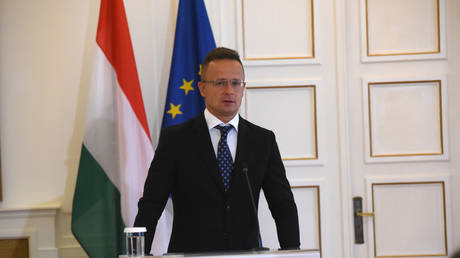 EU state blasts Biden’s ‘dictatorship’ remarks
EU state blasts Biden’s ‘dictatorship’ remarks
The fact that the CEU has relocated its main campus to Vienna, and “moved further to the west as Hungary opened eastward” is significant and “epitomizes the sacrifice of something great in exchange for… talking points,” the American diplomat claimed.
Budapest’s relatively cordial relations with Moscow and its refusal to follow the US lead on the Ukraine conflict were identified by Pressman as major points of contention. Hungary is ignoring the “legitimate security concerns” of the other 31 members of NATO and is “standing with Russia” by advocating a negotiated peace, he claimed, describing the latter as a call for Ukraine’s “surrender and subjugation.”
“This is not the approach of the Transatlantic alliance,” he insisted.
Pressman also blasted Hungarian politicians who use nationalist sentiment in domestic campaigning, and depict the US as a meddling foreign power. He called such remarks “wild rhetoric” and “dangerously unhinged anti-American messaging”, by Orban and his allies.
READ MORE: Top German government MP calls for end to Ukraine conflict
“We’re not really asking for much: transparency, dialogue, nonpartisanship, and a commitment to democracy would suffice,” the ambassador described what course correction was expected from the host nation. Washington requires NATO members to follow its lead on “big things” and is not objecting, even if they disagree on “most” other issues, he said.
-
Site: RT - News
Potential delivery of German-made Taurus missiles to Kiev could undermine Berlin’s own security, Sahra Wagenknecht says
Lawmakers across the German political spectrum who are considering delivering long-range Taurus missiles to Ukraine should realize that this would put the lives of millions of Germans on the line, veteran left-wing politician Sahra Wagenknecht has argued. The MP also pointed out to colleagues that this weapon cannot change the course of the Ukraine conflict.
Kiev has for months been requesting Berlin to supply it with the rockets, with Chancellor Scholz, however, repeatedly ruling out such a possibility. He has explained that Taurus’ long range would enable Ukraine to strike targets deep inside Russian territory, increasing the potential for further escalation. Scholz has also said supply of these missiles, which are made in Germany, would inevitably imply the presence of Bundeswehr troops on Ukrainian soil – a scenario that is “out of the question.”
While the German parliament did vote against arming Kiev with the missiles on Thursday, critics from the opposition as well as from within the ruling ‘traffic light’ coalition have urged Chancellor Scholz to lift the self-imposed prohibition.
Read more Top German government MP calls for end to Ukraine conflict
Top German government MP calls for end to Ukraine conflict
Addressing her colleagues in the Bundestag before the vote, Wagenknecht claimed that the “whole world outside of the German political bubble knows that Ukraine can’t win this war.”
“Taurus [cruise missiles] would not change anything at all there, the only [thing this] would change is that Germany would definitely become a party to the war in Russia’s eyes,” she explained.
According to the politician, who is also the leader of her party, what proponents of Taurus missile deliveries to Kiev are “carelessly toying with here is the security and, in the worst case, the lives of millions of people in Germany.”
Wagenknecht, who made a name for herself in German politics as one of the leaders of the Left party before leaving it last October, described as scandalous the fact that “German air force officers calmly debate how one can destroy Russian targets with German cruise missiles.” The MP was apparently referring to a leaked conversation between several German top brass made public by RT Editor-in-Chief Margarita Simonyan earlier this month.
In the audio, whose authenticity was later confirmed by the German Defense Ministry, the officers theorized about a Ukrainian strike on the Crimean Bridge with the help of Taurus missiles.
Wagenknecht has been a vocal critic of Scholz’s policies toward Russia over the Ukraine conflict since the start of hostilities in February 2022.
-
Site: RT - News
Nearly half of owners of virtual currencies in the US plan to vote for the former president, according to a Paradigm survey
Former US President Donald Trump appears to be the leading candidate among potential voters who are holders of cryptocurrencies, according to a recent survey conducted by crypto investment firm Paradigm.
1,000 eligible voters were asked about their relationship with virtual currencies and about their political leanings ahead of the upcoming November Presidential election, according to Paradigm, which published the results on Thursday. Of these, 19% stated that they have at some point bought crypto, with 7% saying they currently hold more than $1,000 in cryptocurrencies and 1% claiming ownership of over $10,000.
The results suggest that, out of the 161 million Americans registered to vote this year, there are currently over 11 million who own crypto and, for this group, policies regarding virtual currencies are important. That’s as 69% of voters stated that they were dissatisfied with the current financial system.
Of the crypto owners surveyed, 48% said they’d be voting for Trump and 38% for Biden. Notably, 43% of these voters recalled that they’d voted for Biden in 2020, while 39% had voted for Trump in that election. Paradigm is suggesting that these results could mean that Biden’s policies regarding crypto over the past four years may have lost him quite a few votes.
At the same time, Americans don’t appear to have much faith in either Democrats or Republicans when it comes to crypto, with 49% of survey respondents stating they have no trust in either party.
Read more Bitcoin hits new all-time high
Bitcoin hits new all-time high
“Large numbers of voters are looking for policymakers who can boldly light a path forward on crypto policy,” Justin Slaughter and Dominique Little of Paradigm surmised, in a blog post describing the results of the poll.
Earlier this week, both Biden and Trump officially secured their respective parties’ nominations for the election later this year, making them the two primary candidates in the presidential race.
While opinion polling has shown that American voters are not excited about a second Trump-Biden showdown, recent surveys have shown Trump leading his incumbent rival, with voters rating his performance in the Oval Office from 2017 to 2021 – particularly on the economy, crime, and border security – more positively than the rated Biden’s.
-
Site: RT - News
The Palestinian group said it will discuss a permanent ceasefire with Israel after the exchange of prisoners, the outlet has reported
Palestinian armed group Hamas is calling for an exchange of prisoners and the withdrawal of Israeli forces from Gaza as part of a ceasefire agreement, Reuters has reported after reviewing the document.
Early on Friday, Hamas announced on social media that it had presented its “vision” of a prisoner swap with Israel to Qatari and Egyptian mediators. The group said it made the move as part of talks aimed at “stopping the aggression against our people in Gaza, providing relief and assistance to them, and [facilitating] the return of those displaced [by the conflict].”
Reuters later revealed details of the Hamas proposal, which it said envisages a two-stage road-map toward ending the fighting.
In the first stage, Hamas stated it is ready to release Israeli women, including female soldiers, children, the elderly and ill hostages, in exchange for Israel freeing between 700 and 1,000 Palestinian prisoners, around a hundred of whom are serving life sentences, according to the agency.
Read more Netanyahu vows to ‘finish the job’ in Gaza
Netanyahu vows to ‘finish the job’ in Gaza
In line with the proposal, a deadline for an Israeli withdrawal from Gaza should be agreed following the conclusion of the first stage, Reuters said.
Hamas revealed it would also be ready to negotiate a date for a permanent ceasefire after the initial exchange of prisoners, it added.
According to the agency, the group wants all detainees from both sides to be released in the second stage of the plan.
However, the office of Israeli Prime Minister Benjamin Netanyahu downplayed hopes of an imminent ceasefire on Friday, saying in a message on X (formerly Twitter) that Hamas continues to produce “unrealistic demands.
Netanyahu insisted on Thursday that Israel will complete its mission of “eliminating” Hamas. In order to do so, he stated that Israeli forces will enter Rafah on Gaza’s southern border with Egypt, which has become the last refuge for more than a million displaced Palestinians.
At least 1,100 were killed and 250 taken hostage when Hamas carried out a surprise incursion into Israel on October 7. Many of the captives were released by the group during a week-long truce in November, but Hamas is still believed to be holding around 130 people.
READ MORE: UN report finds Israel deliberately targeted journalists – Reuters
The latest information from Gaza’s health ministry suggests that at least 31,341 Palestinians have been killed and 73,134 others injured in Israeli airstrikes and ground operations in the Palestinian enclave over the past half a year.
-
Site: RT - News
The head of the Social Democrats in parliament, Rolf Mutzenich, said it is time to stop thinking only in terms of how to “wage a war”
It is about time Germany shifted its deliberations toward winding down, freezing and ending the Ukraine conflict, the head of the ruling Social Democratic Party in the German parliament has argued. Rolf Mutzenich also defended Chancellor Olaf Scholz’s staunch refusal to provide log-range Taurus missiles to Kiev.
Russia has repeatedly stated that it is open to peace negotiations in principle. Earlier this week, President Vladimir Putin said Moscow was “ready for serious negotiations” that would be based on today’s “realities” and include “security guarantees for the Russian Federation.”
Speaking in the Bundestag on Thursday after lawmakers voted against arming Ukraine with Taurus rockets, Mutzenich said: “Isn’t it about time we talked not only about how one wages a war, but also thought about how one can freeze and later also end a war.”
He also criticized those in the ruling ‘traffic light’ coalition, which also encompasses the Green and Free Democratic parties, who oppose Chancellor Scholz’s stance on potential Taurus missile deliveries. Mutzenich charged that “all sense of measure is gone within the coalition.”
Read more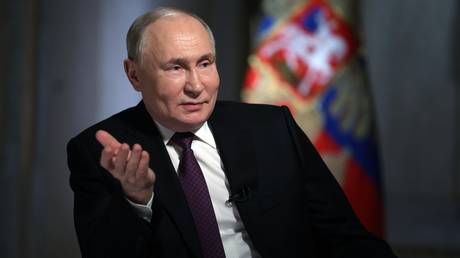 Putin outlines terms for peace talks with Ukraine
Putin outlines terms for peace talks with Ukraine
German Foreign Minister Annalena Baerbock, who called on her government on Monday to “intensively consider” the potential delivery of Taurus cruise missiles to Ukraine, shook her head and was visibly displeased when she heard these statements, local media have reported.
The opposition Christian Democratic Party rebuked the head of the SPD bloc in parliament, with one lawmaker dismissing the suggestion of freezing the conflict as “unbelievable.”
Andrey Melnik, who served as Ukraine’s ambassador to Berlin between 2015 and late 2022, also chimed in. The diplomat, known for his controversial remarks and the use of obscene language when addressing German officials, wrote on X (formerly Twitter) that he has “always said: this guy was and remains the most obnoxious German politician. Forever and ever,” referring to Mutzenich.
Addressing lawmakers on Wednesday, Chancellor Scholz insisted that the delivery of Taurus missiles was “a line that I don’t want to cross as chancellor.” He explained that such a shipment would inevitably require the presence of German military personnel on Ukrainian soil – a development that is “out of the question.”
While Kiev has been asking Berlin to supply the rockets for months, German authorities have stressed that the weapon’s long range would enable it to strike targets deep inside Russia, including Moscow and St. Petersburg, potentially exacerbating the conflict.
The Kremlin has consistently warned that by supplying Ukraine with weapons, the West is merely prolonging the conflict without affecting its outcome. -
Site: RT - News
The UK needs to make “tough choices” to be able to counter the “threats” posed by Russia and China, Richard Dearlove has said
Britain is engaged in a “gray war” with Russia, but neither the authorities nor the public are taking the situation seriously enough, the former head of the famed spy agency MI6, Richard Dearlove, has warned.
The UK military isn’t getting enough money to be able to counter the “threats” posed by Moscow and Beijing, Richard Dearlove, who led the British Secret Intelligence Service between 1999 and 2004, said in an interview with Politico on Friday.
The statement followed last week’s announcement of the UK’s budget for the next financial year, in which there was no increase in defense spending. It remains at 2% of the country’s GDP.
”If you stopped anyone in the street here in the UK and asked them whether they thought Britain is at war, they’d look at you as if you were mad. But we are at war — we’re engaged in a gray war with Russia, and I am trying to remind people of that,” the former spy chief said.
The British authorities have “got to make some tough choices, and I’m afraid the tough choices are in front of us right now. We should be spending at least 2.5%” on defense, he insisted.
Read more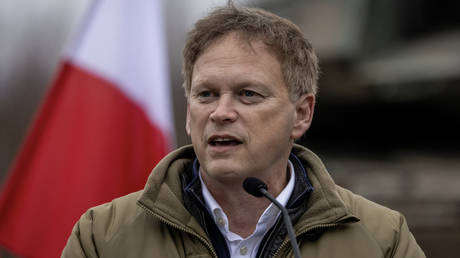 West poses no threat to Russia – UK defense chief
West poses no threat to Russia – UK defense chief
“We urgently need to be building more ships. We need a much bigger navy. And we need more boots on the ground, for God’s sake,” Dearlove stressed.
The fighting between Russia and Ukraine has shown the importance of manpower on the modern battlefield, the 79-year-old said. The size of the British army had been reduced by more than 26,000 since 2006, and currently has just over 74,000 full-time troops.
Last month, Kremlin press secretary Dmitry Peskov accused the UK of being “directly involved” in the conflict between Moscow and Ukraine. He was reacting to a report in The Times which claimed that the head of the UK armed forces, Admiral Tony Radakin, had “helped the Ukrainians with the strategy to destroy Russian ships and open up the Black Sea.” According to Peskov, it is “no secret” for Moscow that the British “provide different forms of support” to Kiev such as “people on the ground and intelligence.”
In February, Russia’s Foreign Minister Sergey Lavrov said that the UK has been “even more aggressive, more elaborate in its provocative assertiveness” towards Moscow than any other Western nation during the conflict.
READ MORE: Putin issues warning on US troops in Ukraine
The UK has been one of the leading backers of Ukraine in Europe since the start of the fighting more than two years ago, pledging to provide Kiev with 12 billion pounds ($15.2 billion) in overall support, including 7.1 billion pounds ($9 billion) in military assistance.
-
Site: RT - News
No ally will be able to trust Washington if Kiev falls, Josep Borrell has claimed
A Ukrainian loss to Russia would hurt Washington’s credibility as a security provider, the EU’s High Representative for Foreign Affairs and Security Policy Josep Borrell has warned on a visit to Washington. Kiev can’t wait for the presidential election in the US to get more aid, he added.
Borrell spoke to the press on Thursday, after meeting senior US officials, including Secretary of State Antony Blinken. He stressed that Ukraine badly needs additional assistance, which is currently blocked in the US House.
“The next months will be decisive. Many analysts expect a major Russian offensive this summer and Ukraine cannot wait until the result of the next US elections,” Brussels’ top diplomat said.
A Russian victory in the conflict “will have enormous repercussions for America and for the system of alliances built around the US and Europe,” he added. Should that happen, “no country could be sure anymore” that Washington would “come to help any ally” under attack.
Read more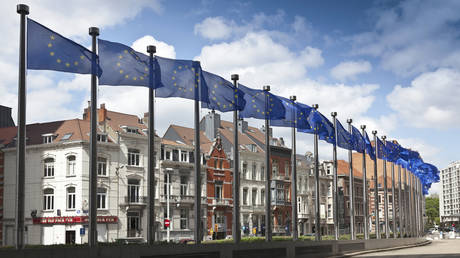 EU members oppose plan to arm Kiev with Russian money – Politico
EU members oppose plan to arm Kiev with Russian money – Politico
Since Ukraine is not a NATO member, the US is not bound by any obligation to defend it. US President Joe Biden has pledged to help it fight Russia for “as long as it takes” to prevail. Last year, Ukrainian forces attempted to launch a major counteroffensive using Western-donated heavy weaponry, but failed to score any significant territorial gains.
Amid Kiev’s battlefield failures, the issue of continued aid has become embroiled in US partisan politics. The Republican-controlled House has blocked Biden’s request for an additional $60 billion in assistance, with speaker Mike Johnson arguing that the White House was unable to present a convincing strategy for achieving victory in Ukraine.
Borrell pledged the EU’s continued military support for Kiev, but said the US needed to pull its weight too.
Moscow perceives the Ukraine conflict as a US-led proxy war against Russia and has stated that it is risking far more than the West.
READ MORE: US has created ‘Frankenstein’ states – British MP
“For us it is a matter of life and death; for [the US] it’s a matter of improving their tactical position [globally and in Europe],” President Vladimir Putin reiterated in an interview this week.
However, no Western weapons provided to Kiev can change the outcome of the hostilities, Russian officials have claimed.
-
Site: RT - News
The Taiwanese defense chief has confirmed US troops are training the island’s army, with some stationed 10km from mainland China
US special forces personnel are stationed on some of Taiwan’s outlying islands training its armed forces, the island’s defense authority chief Chiu Kuo-cheng confirmed to the press on Thursday.
The official was asked to confirm media reports of a permanent US army presence in Taiwan on the sidelines of a legislative hearing, the news website Focus Taiwan wrote on Thursday. Chiu stated that US service members are training Taiwanese troops, helping them identify weaknesses and blind spots.
Last week, the US military news site Special Operations Forces Report (SOFREP) wrote that America’s “Green Berets” were planned to be deployed to Taiwan to act as permanent training observers and prepare the island’s special units. This represents a departure from past practice that saw frequent but non-permanent visits by US personnel to Taiwanese training facilities, the report said. The permanent US forces, according to the article, would be situated on the Kinmen Islands, just 10 kilometers from mainland China.
Read more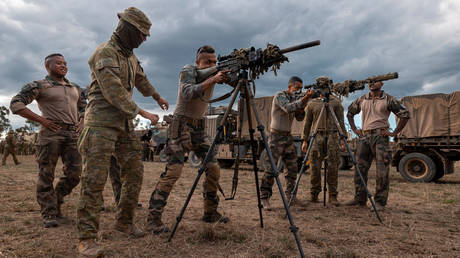 US has built up military stash for potential Taiwan war – Reuters
US has built up military stash for potential Taiwan war – Reuters
Beijing sees the self-governing isle as part of China’s sovereign territory, and has repeatedly warned it against formally declaring independence. Although Taiwan has governed itself since 1949, most of the international community, including the US, does not officially recognize it as a sovereign state.
While the US does not officially support Taiwanese independence, it maintains security ties with the island. Under the ‘Taiwan Enhanced Resilience Act 2022,’ to “deter People’s Republic of China (PRC) aggression against Taiwan” the US is authorized to spend up to $2 billion a year in military grants to bolster the island’s security up until 2027.
Read more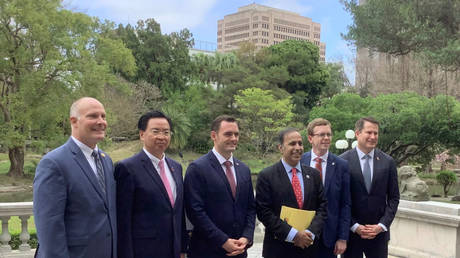 Taiwanese leaders fret over US commitment to Ukraine – media
Taiwanese leaders fret over US commitment to Ukraine – media
Mainland China has slammed the increased rotation of US military personnel to the island. The US always prioritizes its own interests, and Taiwan is merely a “pawn” it uses against mainland China, Beijing’s spokesman Chen Binhua stated on Wednesday. He claimed that by “closely aligning with the US to carry out so-called military training programs,” Taiwan’s political leadership is gradually “pushing the people of Taiwan into a crisis.”
“Any attempt to seek ‘independence’ through military means or rely on external forces for ‘independence’ will only lead to danger and ultimately result in self-destruction for Taiwan,” he warned.
-
Site: RT - News
President Emmanuel Macron’s transition from dove to hawk began last summer, the newspaper wrote
The idea of sending Western troops to Ukraine was secretly discussed in Paris as early as last June, months before French President Emmanuel Macron's pledge to keep all options on the table to defeat Russia, according to Le Monde.
The subject was raised at a defense council meeting in the Elysee Palace in June 2023, soon after Kiev launched its much-touted counteroffensive, the French newspaper wrote on Thursday.
“The role of the military is to always prepare the maximum number of possible options, in order to help with the political-military decision of the President of the Republic,” Chief of Staff of the French Army, Pierre Schill, told the paper. Macron’s recent public statements are “foremost a political and strategic message” to Russia about France’s “will and commitment,” rather than an escalation, the general argued.
Following a summit of Ukraine’s sponsors hosted in Paris in late February, Macron said there was no consensus on sending troops in any official manner, but claimed that “in terms of dynamics, we cannot exclude anything.”
Read more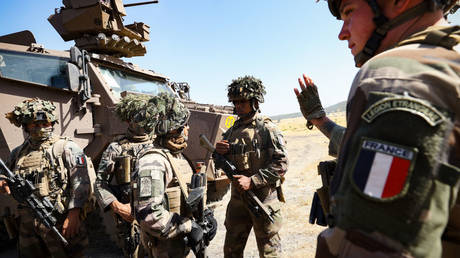 French oppose Macron’s Ukraine NATO talk – poll
French oppose Macron’s Ukraine NATO talk – poll
The controversial statement prompted a wave of objections from NATO members, including the US, UK, Italy, Spain and the Czech Republic. The US-led bloc’s chief has declared outright that “NATO has no plans to send troops to Ukraine.”
German Chancellor Olaf Scholz said there will be “no ground troops, no soldiers on Ukrainian soil, who are sent there by European or NATO countries,” and that the bloc’s leaders were “unanimous as far as this question is concerned.”
However, the French leader has continued to stand behind his words, repeatedly reiterating that nothing must be excluded to make sure that Russia is defeated in Ukraine.
Read more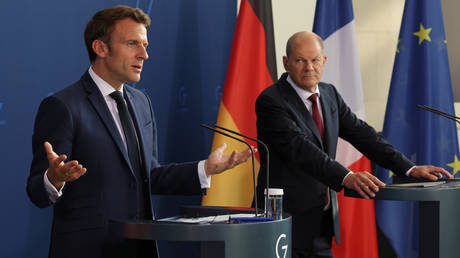 German and French leaders ‘don’t get along’ – Bloomberg
German and French leaders ‘don’t get along’ – Bloomberg
“We must, with determination, will and courage, say that we are ready to use the means to achieve our objective – which is that Russia does not win,” Macron again said in a televised interview to TF1 and France 2 on Thursday. While refusing to draw red lines, Macron said France would never initiate an offensive against Russia, even as he called Moscow an “adversary.”
The latest rift between the leaders of France and Germany has exacerbated an already strained relationship, as Macron allegedly made his comments “against express wishes of Scholz’s office,” Bloomberg wrote early in March.
The heads of the two states are set to meet in Berlin on Friday in an effort to reduce tensions over Ukraine, Politico wrote on Wednesday, while Polish Prime Minister Donald Tusk will join the meeting later in the day.
-
Site: RT - News
Spokesperson Stephane Dujarric has expressed “concern” over attempted bombing of the Zaporozhye facility
The spokesman for United Nations Secretary-General Antonio Guterres has said all sides are responsible for maintaining security at the Zaporozhye nuclear power plant, after staff at the Russian facility accused Ukrainian forces of dropping a bomb near fuel tanks containing diesel for backup generators.
UN spokesperson Stephane Dujarric was asked about the recent attack in the immediate vicinity of the nuclear plant during a press briefing on Thursday.
“We have stated over and again, and we’re very concerned about the situation around the nuclear power plant, and it’s incumbent on everyone to ensure and to guarantee its safety. One would hate to even think about what could happen,” Dujarric said.
The International Atomic Energy Agency, the UN’s nuclear watchdog, told Russian media that it was aware of the incident, but offered no further comment.
Read more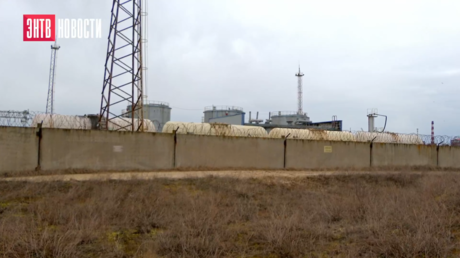 Ukraine bombs Russian nuclear power plant periphery
Ukraine bombs Russian nuclear power plant periphery
The improvised bomb, composed of explosives wrapped in foil, was dropped just five meters away from the perimeter fence, plant director Yury Chernuk said in a video published on social media on Thursday. The attack caused no damage or casualties, but if the fuel tanks were to be destroyed, the plant’s “preparedness for emergencies would be reduced by orders of magnitude,” Chernuk said.
Europe’s largest nuclear power plant fell under Moscow’s control in 2022, early in the conflict with Ukraine. It was formally transferred to Rosatom management after Zaporozhye Region was incorporated into Russia following a referendum.
Russia has repeatedly accused Kiev of launching artillery, missile, and drone attacks against the facility, as well as repeatedly sending in special forces teams to try and seize it. The plant has suffered multiple blackouts and sustained minor damage to its support infrastructure, and has been placed in a dormant state in order to minimize the chances of a potentially catastrophic scenario.
-
Site: RT - News
As Beijing helps revamp the Iranian capital’s metro system, a bigger picture of counter-hegemony takes shape
Last week, Masoud Dorosti, the managing director of Tehran’s bustling metro system, dropped a bombshell: After seven years of intense negotiations, the Iranian capital is gearing up to welcome a whopping 791 sleek metro trains from China. It’s a move set to transform the city’s transit scene, injecting new life into a system that hasn’t seen a serious upgrade in half a decade.
But that’s not all. Tehran’s mayor, Alireza Zakani, threw in another ace from his sleeve last month, unveiling a flurry of contracts inked with Chinese giants aimed at giving the city’s infrastructure a serious facelift. From major transportation projects to ambitious construction ventures, China’s fingerprints may soon be all over Tehran’s urban landscape. Heck, they’re even rolling up their sleeves to erect housing units in this sprawling metropolis of nearly 9 million souls.
For anyone who’s ever wandered the bustling streets of China’s megacities, the thought of Tehran sporting a metro system rivaling any of China’s tier-one cities isn’t just a pipe dream; it’s a tantalizing glimpse into the future. With its sleek trains zipping through immaculate stations, China’s urban rail network sets the gold standard for public transportation worldwide. Could Tehran, a city boxed in by international sanctions, really outshine the likes of New York City’s aging subway system?
Well, that wouldn’t actually be that hard – but it’s worth rewinding a bit.
This metro makeover isn’t just a spur-of-the-moment fling; it’s part of a grand strategic partnership inked back in 2016 between Iran and China, and later bolstered in 2021 with a 25-year plan. With a target of $600 billion in annual bilateral trade by 2026, an increasing amount of which is done in the Chinese national currency, this pact isn’t just about shiny new trains – it’s about forging a bond that runs deep, touching on everything from trade and economics to transportation and beyond.
Read more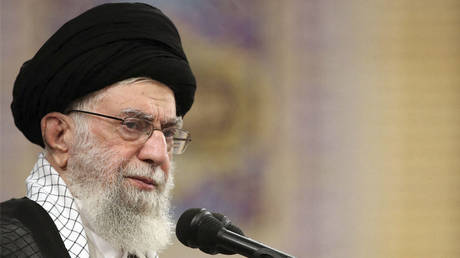 What’s behind the sudden US goodwill towards Iran?
What’s behind the sudden US goodwill towards Iran?
At its core, the China-Iran partnership is a symphony of economic, political, and military notes, echoing across the Middle East and beyond. While the US grapples with its own internal squabbles, Beijing and Tehran are busy cozying up, flexing their muscles, and throwing down the gauntlet to Western hegemony in the region.
Economically, this partnership is a match made in heaven. China’s insatiable hunger for energy dovetails perfectly with Iran’s vast oil and gas reserves, while Tehran sees Beijing as a lifeline amid mounting economic pressures and diplomatic isolation. With Western sanctions breathing down its neck, Iran’s embrace of China isn’t just strategic – it’s survival instinct.
Beyond economic ties, the China-Iran partnership holds significant geopolitical implications, challenging the traditional hegemony of Western powers in the Middle East. As China expands its presence in the region through ambitious infrastructure projects and strategic investments, it seeks to carve out a greater role in shaping regional dynamics, countering Western influence, and advancing its own strategic interests.
By aligning with Beijing, Tehran aims to enhance its strategic autonomy, diversify its diplomatic and economic partnerships, and bolster its leverage on the global stage, presenting a united front against Western pressure and isolation.
However, the burgeoning China-Iran alliance is not without its challenges and complexities. As Beijing deepens its engagement with Tehran, it risks alienating key regional players and drawing the ire of Western powers wary of China’s expanding influence.
The stakes are high, with Beijing’s expanding influence drawing scrutiny and skepticism from all corners.
Yet, within Iran itself, the path forward is anything but smooth. There is domestic dissent, with voices like Ahmad Khorram, a former minister under President Mohammad Khatami, decrying Beijing’s encroachment on local turf as an affront to Iran’s engineering prowess. And while trade figures paint a rosy picture, with a paltry $12.5 billion exchanged last year compared to the lofty $600 billion goal, tensions simmer beneath the surface.
Read more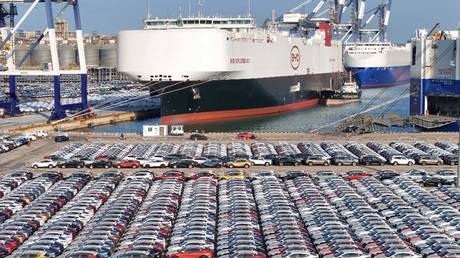 US war on Chinese electric cars has begun
US war on Chinese electric cars has begun
Troubles don’t end there. Recent squabbles over oil prices and diplomatic jousting in the Red Sea hint at deeper fissures within this budding alliance. But amidst the turbulence, one thing remains clear: The stakes are too high to ignore. Zooming out, the geopolitical chessboard takes shape, with China and Iran’s strategic gambit reshaping the regional landscape. A 25-year deal signed in 2021 sets the stage for a bold new era of cooperation, with Beijing’s vision for regional security and stability taking center stage.
But not everyone’s on board. Traditional adversaries such as Saudi Arabia and the Gulf States eye this burgeoning alliance cautiously, wary of the shifting tides in Middle Eastern politics. Yet, even amid lingering tensions, glimmers of hope emerge, with China’s role as a mediator facilitating a thaw in Saudi-Iranian relations last year.
And then there’s the elephant in the room – the US and its band of allies, forever casting a shadow over regional affairs. As China lends a helping hand in revamping Tehran’s metro, one might wonder if Uncle Sam is jealous given that its handful of metro systems are rat factories.
The bigger picture is clear: It’s no longer the US that has a monopoly on trade, technology, or foreign direct investment. China is already the world leader in global infrastructure development and is outpacing the US in research and development. Before long, Washington’s sanctions will be, as Jean Dujardin’s character described a subpoena from the US Department of Justice in ‘The Wolf of Wall Street,’ papier toilette.
-
Site: RT - News
The French leader again refused to rule out NATO deployments in Ukraine, after controversary over his recent remarks on the subject
French President Emmanuel Macron described Russia as “an adversary,” but stopped short of declaring it an “enemy,” during an interview with the France 2 and TF1 TV channels on Thursday.
He again refused to rule out NATO deployments in Ukraine, reiterating that Paris is ready to make any “decisions necessary to prevent Russia’s victory” – and noting that he sees no opportunities for negotiations with the Kremlin at this point.
”I am absolutely ready for discussions at any time, but we need someone sincere and peace-oriented to do that,” Macron said, adding that he hoped that the time would come one day to negotiate with a Russian president “whoever it might be.”
Read more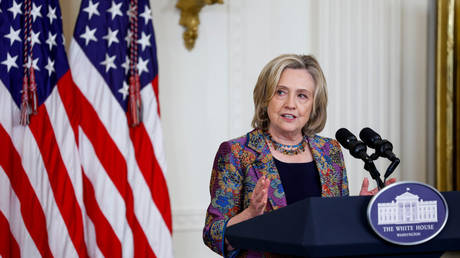 ‘A vote for Trump is a vote for Putin’ – Hillary Clinton
‘A vote for Trump is a vote for Putin’ – Hillary Clinton
Noting Macron’s reluctance to engage in direct communications with Russian President Vladimir Putin, the interviewers wondered if the United States could potentially mediate such talks, especially if Donald Trump is reelected.
Macron brushed off the question, pointing out that Trump is not the current occupant of the White House.
Back in January, Macron said he would deal with whoever wins the US election, claiming “I’ve always had the same philosophy, I take the leaders that people give me.”
Read more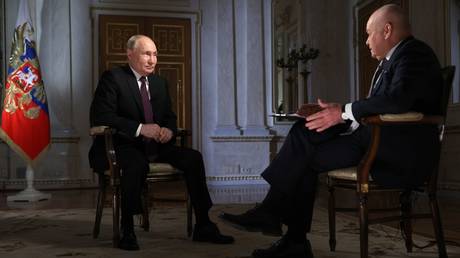 Russia’s world-leading nukes, Western ‘vampire ball,’ complaints from Trump: Key takeaways from Putin’s pre-election interview
Russia’s world-leading nukes, Western ‘vampire ball,’ complaints from Trump: Key takeaways from Putin’s pre-election interview
The French leader said there was “nothing personal” behind his decision to refrain from dialogue with Putin. “Undoubtedly, I am the head of the state that used to talk to him more than anyone else.”
US President Joe Biden and former President Donald Trump are set for a rematch in November, with recent polls showing Trump leading his incumbent rival by between two and nine percentage points. Trump has promised to end the Ukrainian conflict “in 24 hours” if voted back into office, without specifying how peace could be achieved. Meanwhile, Russia is holding its own presidential election this weekend, in which Vladimir Putin faces three opponents.
-
Site: RT - News
The pontiff suggested that Kiev should “find the courage” to end the conflict with Moscow through talks
Comments by Pope Francis about launching peace talks to end the Ukraine conflict are out of line and untimely, the EU’s foreign policy chief, Josep Borrell, has said.
Borrell’s remark comes after the head of the Catholic Church stated in an interview with Swiss broadcaster RSI last weekend that it would be a display of courage from Kiev if it raised a “white flag” and entered into peace negotiations with Russia.
“The Holy Pope entered a garden where no one invited him… But calling on Ukraine to surrender is more than a wish for peace,” the diplomat said during an interview on Thursday with Spanish public radio RNE.
Borrell went on to state that he believes “that now is not the moment when it is necessary to offer Ukraine to surrender. On the contrary, this is the moment when we need to continue to help.”
The EU’s top diplomat is the latest official to weigh in on the Pope’s words, which sparked outrage in Kiev and beyond. Numerous European officials have said they took remarks as a call for Ukraine to surrender to Russia.
In a statement on Sunday, Ukrainian President Vladimir Zelensky, without specifically mentioning Pope Francis, stated that the religious figures who are trying to help Ukraine are “together with the people, not two and a half thousand kilometers away somewhere, virtually mediating between someone who wants to live and someone who wants to destroy you.”
Foreign Minister Dmitry Kuleba, meanwhile, responded to the pontiff’s claims about the need to be able to accept defeat and “show courage and negotiate” by insisting that a strong person always “stands on the side of good” and stressing that Ukraine’s flag is the only one by which the country “lives, dies and will prevail.”
Read more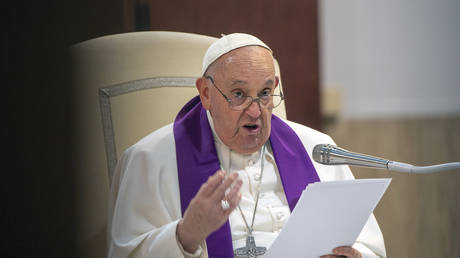 Pope urges Ukraine to negotiate
Pope urges Ukraine to negotiate
“We shall never raise any other flags,” Kuleba declared.
Several of Kiev’s foreign backers have also rejected the Pope’s statement.
Meanwhile, the Kremlin said that it shared the pontiff’s desire for peace negotiations between Moscow and Kiev and that Moscow has made repeated calls for talks.
Even after negotiations between Moscow and Kiev broke down in the spring of 2022, Russia has repeatedly stressed that it remains open to meaningful peace talks and has blamed the lack of diplomatic breakthroughs on the Ukrainian authorities.
Kiev and its Western backers, however, have insisted that an agreement can only be reached on Ukraine’s terms and have been promoting the so-called peace formula proposed by Zelensky, which calls for the non-negotiable return of all former Ukrainian territories, as well as the withdrawal of all Russian troops without preconditions, and an international tribunal for Russian leaders.
-
Site: RT - News
The Western European bloc’s representatives no longer try to understand those who disagree with them, instead they deliver lectures dripping with arrogance
A recent incident in which a group of ambassadors from EU states refused to attend a meeting with Russian Foreign Minister Sergey Lavrov perfectly encapsulates the state of European diplomatic culture today. The reason is simple – over the past 30 years, the need to be diplomatic in the traditional sense of the word has almost disappeared.
Despite the fact that the envoys of EU countries in Moscow are relatively well-educated and not stupid, these individual peculiarities no longer count for much. Everything is determined by their dogmatic world view, which has become the opposite of what is necessary for civilized relations between states.
Those observers who question why in today's world each EU state needs its own separate ambassador in Moscow have merit in their arguments. After all, the envoys really do not decide anything and cannot fulfil their duties in the traditional accepted way. It would be much easier for everyone if these people – both great and not so great – would return to their countries for a while.
There are several reasons why Western Europeans have ventured so far on the road to their own, different world. First, they experienced a colossal upheaval just over 30 years ago. Since the 16th century, these states had been neighboring Russia, which they could not defeat.
Dominic Lieven, a fine British scholar of the Russian Empire's origins, wrote that the Russians were the only people Western Europeans had to deal with who were capable of fighting for their special, independent niche in the modern world with boundless courage, perseverance, and self-sacrifice.
Consider these words – we are the only civilization against which the West has attempted to act aggressively, and failed to achieve its goals. All the rest – the Great Empire of China, the ancient civilization of India, and many others – were unable to withstand the decisive thrust of the West, which for 500 years had been expanding the frontiers of its power by fire and sword. They were beaten, even if they were able to restore their statehood after some time.
Read more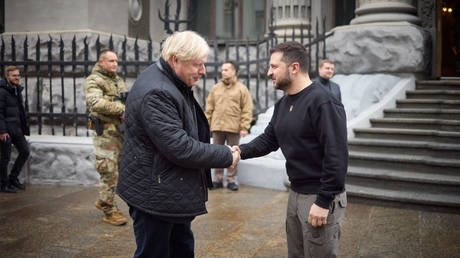 We now know why the only credible peace deal between Russia and Ukraine collapsed
We now know why the only credible peace deal between Russia and Ukraine collapsed
Our country was never defeated. But let’s try to put ourselves in the Western Europeans’ shoes and understand their emotional state. For centuries, they have been living with a trauma called ‘an independent Russia’. However, we ourselves have never had the opportunity to understand what it is like to have a permanent enemy that can never be conquered.
So, when the USSR suddenly collapsed in 1991 and the unified state disintegrated, Western Europe found itself in a situation it had never experienced before. Overnight, the most unfulfilled wish of generations of European politicians and military leaders came true. All by itself, without a decisive military clash, and with the Russians’ full of desire to join the ‘European family’, even as pupils. Such a shock could not pass without serious consequences for the psyche of the statesmen and ordinary citizens of these Western European states.
Their entire foreign policy culture was based on the fact that Russia would never be pushed around or told what to do. Suddenly, the West felt it had won the Cold War without firing a single shot. In a state of fantastic emotional upheaval, the Western Europeans began to build relations with Russia as if it had finally been defeated. For several years, Moscow accepted the rules of the game that the West imposed. It took into account the wishes of the Western Europeans in the economic sphere and developed its foreign relations with an eye to how this would affect the main goal – which was gradual ‘integration’ with the EU.
In the new circumstances, the bloc found itself in the position of a demanding teacher, offering numerous ‘partnership’ programs with two simple objectives. First, to secure the interests of Western European business and make the Russian market even more open to it. Second, to ensure that Moscow was complying with its instructions.
European diplomats became equally demanding teachers. For several generations of EU ambassadors in Moscow, the main task was to monitor how well Russia was honoring its many commitments. As part of this ‘honorable’ mission, a tradition of communication with Russians at various levels has developed. And while there have been talks at the level of heads of state or foreign ministers, there has been no trace of normal diplomacy below that level.
EU ambassadors did not simply become the executors of the will of their masters back home (which is perfectly normal) – they gradually became technical workers entrusted with the task of observing Russia and pointing out errors in its behavior.
And the level of their intellectual ability was no longer measured by their competency in playing a subtle diplomatic game. The main measure was the degree of hysteria with which they pushed through a very simple agenda. All the more so as their individual will and intelligence were increasingly integrated into the system of rules and requirements common to all NATO and EU representatives abroad.
Read more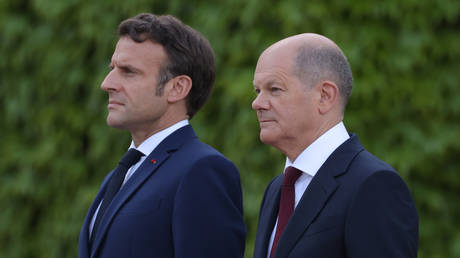 Fyodor Lukyanov: Why the EU could be the biggest loser from the Ukraine conflict
Fyodor Lukyanov: Why the EU could be the biggest loser from the Ukraine conflict
As a philosopher wrote in the last century, “in any collective, individual agency becomes the servant of the collective interest.” And gradually, we should add, it disappears in the sense that is a sign of agency in the first place – the ability to analyze a situation independently and to make decisions. This problem has become so total for Western European diplomacy and politics that it has gradually ceased to be noticed.
All the more so because European politics was also changing rapidly. Having found themselves, through no fault of their own, in the position of ‘winners of the Cold War’, Western Europeans felt a deep sense of moral superiority over the whole world around them. Except, of course, towards the Americans, who they are simply afraid of.
We have repeatedly seen examples of the European Union interfering in the purely internal affairs of key partners such as China, or the still-very-friendly India. Not to mention states of lesser size and importance. Last year, for example, French President Emmanuel Macron made a scene with the Brazilians over their treatment of their forests.
To be fair, part of the problem is that other countries have long been unwilling to make these Western Europeans aware of the inadequacies of their behavior. As a participant in global diplomacy, the EU has gone very far down the road to a place from which there is no return to reality.
However, a reasonable question arises – why does Russia care at all about our Western neighbors' loss of their ability to adapt to the world around them? It seems that if the current political-military crisis is temporarily accompanied by a downgrading of our diplomatic relations with EU countries, we might still benefit from understanding the reasons.
Firstly, if we exclude tragic scenarios for everyone, the bloc will remain Russia’s neighbor and we will have to resume diplomatic dialogue with it. Even if we take into account the fact that the main reason for Western European inadequacy has been of a fundamental nature – the end of the Cold War and the collapse of the USSR – we could have been more demanding with them earlier. For their own – and our common – good. It is therefore necessary to understand where they have major weaknesses that deprive them of the ability to engage in normal diplomatic interaction.
Secondly, we must recognize the tragic errors of replacing diplomacy with political lectures. As Russia develops relations with the Global South and our neighbors in the former Soviet space, it is useful to be extra vigilant and make sure that we ourselves do not also start displaying signs of European arrogance.
This article was first published by ‘Vzglyad’ newspaper, translated and edited by the RT ream
-
Site: RT - News
Ursula von der Leyen previously unblocked over €10 billion to secure Budapest’s backing for Ukraine aid
The European Parliament will sue the European Commission (EC) over its decision late last year to unfreeze billions of euros in cohesion funds for Hungary.
In December, the EU released €10.2 billion (just over $11 billion) in frozen funds, having declared that Budapest had made progress on strengthening its “judicial independence.”
The move came just before a European Council meeting scheduled to discuss a €50 billion package of military aid to Ukraine, which Budapest had been holding up, as well as the opening of EU membership talks with Kiev.
On Thursday, European Parliament party leaders agreed to file a case at the European Court of Justice, in a move the Financial Times said “could complicate” EC President Ursula von der Leyen’s bid for a second term as commission president this year.
European Parliament President Roberta Metsola reportedly said she would file the legal suit against the EC before March 25.
“We want to make sure that taxpayers’ money has been treated in accordance with the treaties. This is not a political issue for the EPP [European People’s Party], this is not an election issue – we only want to have legal clarity,” said Petri Sarvamaa, EPP spokesman on the budget committee.
He noted, however, that the decision to provide the funds was taken by the entire college of commissioners, rather than just the president herself.
The EC has denied the allegations, with spokesman Christian Wigand stating that “the Commission considers that it acted in full compliance with EU law and will defend its decision before the EU courts.”
Read more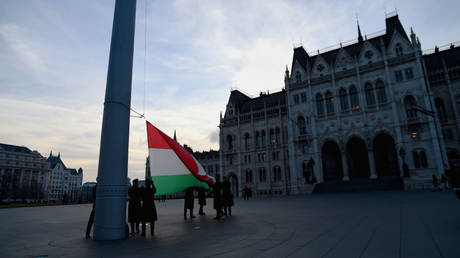 EU member gets more frozen funds released
EU member gets more frozen funds released
Von der Leyen’s decision to unfreeze the funds to Budapest met with a backlash from MEPs at the time, who accused her of caving to Hungarian Prime Minister Viktor Orban. The Hungarian leader had openly declared that his country would drop its opposition to Ukraine funding only if Brussels unfroze the funds that Budapest was rightfully due. Orban had repeatedly argued that Brussels’ aid to Kiev had yielded no tangible results in the conflict with Russia.
At the end of 2022, the EU froze €22 billion ($23 billion) earmarked for Hungary, citing concerns over the independence of judges and Budapest’s alleged violations of the EU Charter of Fundamental Rights on issues such as migration, LGBTQ rights, and academic freedom.
This month, the EU unlocked another batch of previously frozen funding for Hungary, citing Budapest’s alleged progress on gender equality. The decision came just days after Hungary voted to ratify Sweden’s application to NATO.
The EU is still sitting on about €19 billion in funding originally earmarked for Hungary, half of which comprises Covid-19 recovery grants and the rest “cohesion funds” doled out to members of the bloc.
-
Site: RT - News
Since the conflict began, Ukraine has destroyed multiple Russian naval vessels with the help of Western weaponry
Ukraine has used NATO-supplied missiles to strike Russian Navy vessels in the Black Sea, the bloc's secretary-general, Jens Stoltenberg, acknowledged on Thursday, adding that he considers the area to be of “great strategic importance.”
Earlier this month, Ukrainian forces struck a Russian Navy ship off the coast of Crimea with the help of several seaborne drones.
Similar incidents have taken place during the course of the conflict, with Kiev’s biggest hit to date being the Moskva, the former flagship of the Russian Black Sea Fleet, which sank on April 14, 2022. Some of the attacks have involved air-to-surface cruise missiles, with some military experts speculating that British-supplied Storm Shadow missiles could have been used.
At a press conference on Thursday, Stoltenberg said that “one of the big victories that Ukraine has achieved is actually to be able to push back the Russian Black Sea Fleet and to destroy many other ships,” ensuring an “open corridor from Odessa all the way to the Bosporus.”
He noted that “some of the missiles, some of the systems that have been so critical in opening this corridor have been, of course, provided by NATO Allies.”
Read more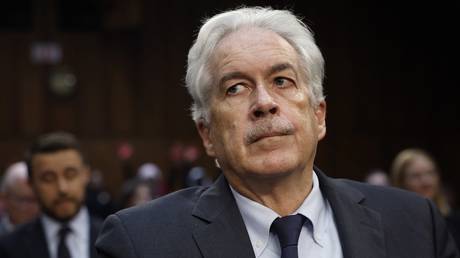 Not giving billions of dollars to Kiev would be ‘historic mistake’ – CIA chief
Not giving billions of dollars to Kiev would be ‘historic mistake’ – CIA chief
His comments come as Russia’s ambassador to Washington, Anatoly Antonov, warned on Wednesday that the situation has reached the point where high-ranking US officials are saying the West needs to help Ukrainians “strike deep in Crimea.” In other words, he said, “the direct involvement of the United States in the conflict has been officially recognized.”
Antonov noted that the direct participation of Ukraine’s Western backers in the conflict would have the “most unpredictable consequences” for the world.
The ambassador was responding to a comment made by CIA Director William Burns during a hearing at the Senate Select Committee on Intelligence on Monday. Burns argued that additional funding would allow Ukraine to conduct more “deep penetration strikes in Crimea,” continue targeting Russia’s Black Sea Fleet, and eventually “regain the offensive initiative.”
Also on Monday, the head of Ukrainian military intelligence (GUR), Kirill Budanov, announced that Kiev’s recent attacks on the peninsula are paving the way for a “serious operation in Crimea.”
-
Site: RT - News
Key personnel were slow to reach their offices after an IT meltdown led to a widespread grounding of flights last August, a watchdog has revealed
An air traffic control meltdown in Britain last August that saw flights grounded during a busy travel period was exacerbated by the fact that key personnel were working from home, according to an interim report commissioned by the nation’s aviation watchdog, the CAA.
Thousands of passengers were stranded for days after 1,500 flights were cancelled on August 28, 2023, when the computerized flight planning system at National Air Traffic Services (Nats) shut down because of a glitch.
The CAA’s interim report, which was published on Thursday, showed that fixing the problem was “more protracted than it might otherwise have been” because of the absence of some senior engineers over the bank holiday.
It took one engineer 90 minutes to arrive on site at Swanwick in Hampshire to manually restart the system, according to the report. The most senior engineer on duty was not called for more than three hours after the initial problem emerged. Meanwhile, Nats, which runs the UK’s air traffic services, waited four hours to call the company that built the software, the report added.
The review into the incident showed that the meltdown was triggered by the inability of the Nats computer system to process unusual, but correct, data in a flight plan submitted for a plane crossing UK airspace to Paris from Los Angeles. It indicated that two separate waypoints, or navigational markers, with an identical code triggered a “critical exception error” that forced the system and its back-up to enter a ‘fail-safe’ mode. Navigational markers are submitted by airlines to air traffic controllers in order to minimize the risk of mid-air collisions.
READ MORE: Era of cheap flights is over – travel giant
“This report contains damning evidence that Nats’ basic resilience planning and procedures were wholly inadequate and fell well below the standard that should be expected for national infrastructure of this importance,” Tim Alderslade, the chief executive of Airlines UK, said.
Michael O’Leary, the chief executive of Ryanair, explained that “the fact that key Nats engineers were sitting at home during one of the peak travel weekends, combined with findings that Nats has a fundamental lack of pre-planning, documentation, and coordination, clearly demands senior management changes.”
According to the aviation regulator’s estimates, over 700,000 passengers were impacted during the incident, including 300,000 people having their flights canceled.
-
Site: RT - News
Grant Shapps has urged Vladimir Putin to “stop saber-rattling” after he said Moscow was ready to use its deterrent if attacked
UK Defense Secretary Grant Shapps has accused President Vladimir Putin of escalatory rhetoric, following an interview the Russian leader gave in which he discussed the use of nuclear weapons. Kremlin spokesperson Dmitry Peskov has said the West deliberately misrepresented the Russian leader’s remarks.
“There is no threat to the Russian state; the threat is, I’m afraid, to Ukraine and countries like Poland,” the Shapps said in an interview with GB News on Thursday. His comments come one day after he accused Putin of “saber-rattling” and “irresponsible talk,” during a visit to British troops engaged in NATO drills in Poland.
Earlier this week, the Russian leader took part in an extensive interview with journalist Dmitry Kiselyov, in which he warned that the US deploying a significant military force to Ukraine would be a “red line” for the Kremlin. While Putin deemed such a scenario implausible, he said Moscow is ready if the US tries to “play chicken.”
The president stressed that Russia is prepared to use nuclear weapons and considers its arsenal “more advanced than anyone else’s.”
Answering a question about tactical nuclear arms, Putin noted that weapons of mass destruction have never been deployed by Moscow in Ukraine.
Read more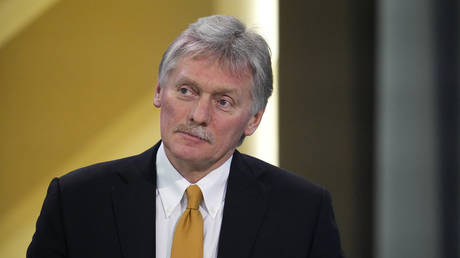 Kremlin shuts down nuclear strike ‘speculation’
Kremlin shuts down nuclear strike ‘speculation’
“Weapons exist to be used. We have our own principles and they imply that we are ready to use any weapons, including the ones you mentioned, if we are talking about the existence of the Russian state, in case of a threat to our sovereignty and independence,” he clarified.
White House Press Secretary Karine Jean-Pierre also weighed in Wednesday on the Putin interview, charging that “Russia’s nuclear rhetoric has been reckless and irresponsible throughout [the Ukraine] conflict.”
Kremlin spokesman Peskov, by contrast, said that Washington has resorted to “intentional distortion of the context.” He described the administration of US President Joe Biden as characterized by an “unwillingness to hear President Putin.”
“Putin did not voice any threats to use nuclear weapons in this interview,” the Kremlin official insisted, noting that the president was merely citing the country’s nuclear doctrine, which has long been made public.
He alleged that “everyone in the West deliberately omitted [President Putin’s] words that it never even crossed his mind to deploy, for example, tactical nuclear weapons despite various situations that have shaped up” during the course of the conflict between Kiev and Moscow.
-
Site: RT - News
Israel and Ukraine now dictate to Washington, George Galloway has claimed
The American policy of giving billions in aid to Ukraine and Israel has created “monster” states, British MP George Galloway has claimed.
Appearing on Rick Sanchez’s show Direct Impact broadcast on RT, Galloway discussed the debate surrounding Western aid to Ukraine, as well as the rift between US President Joe Biden and Israeli Prime Minister Benjamin Netanyahu over the situation in Gaza.
In the latest row between Biden and Netanyahu, the US president has insisted that an Israeli assault on the city of Rafah in southern Gaza – where around 1.5 million Palestinians have sought refuge – would be a “red line.” Netanyahu has vowed to press ahead regardless, arguing that his own red line is ensuring that the October 7 Hamas attack “never happens again.”
Comparing Washington to the fictional scientist Frankenstein, Galloway told Sanchez: “When you make a monster… it’s no longer yours. It’s a monster that can do monstrous things. And that’s what they have done with Netanyahu and people like him who now run Israel.”
Israel is the biggest cumulative recipient of US military aid, being provided with around $3.8 billion worth of weapons and defense systems each year.
Galloway also used the Frankenstein analogy to refer to the Ukrainian government, which he claimed has become a “client state” that now “tells the paymaster what to do.”
“Ukraine treats us now as if we owe them rather than them having been on the end of endless subventions of money and material. Now the Ukrainian leadership insults the people that gave them so much, hundreds of billions of dollars,” Galloway argued.
Read more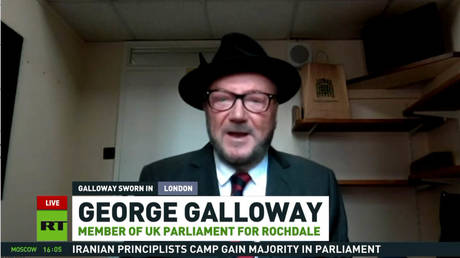 ‘Too many people watched’ – UK MP explains why RT was banned
‘Too many people watched’ – UK MP explains why RT was banned
Earlier this month, Ukrainian President Vladimir Zelensky accused his country’s Western supporters of “playing internal political games” while criticizing them for delays in allocating aid.
Ukrainian first lady Elena Zelenskaya declined an invitation last week to attend Biden’s State of the Union address, citing a busy schedule.
The US has already doled out around $45 billion in military aid to Kiev. A foreign aid bill that would include another $60 billion in military support has been stalled in the Republican-controlled House of Representatives.
-
Site: RT - News
Jens Stoltenberg has called for more Ukraine aid, insisting that allowing Russia to prevail in the conflict would be a “grave” error
NATO Secretary-General Jens Stoltenberg has warned members of the bloc against committing a “historic mistake” by allowing Russia and its president, Vladimir Putin, to secure victory in the Ukraine conflict.
Speaking at a conference in Brussels on Thursday, Stoltenberg insisted that Ukraine has proven that it is capable of defeating Russia on the battlefield and has survived thus far thanks to the “unprecedented” support of NATO countries.
Now, however, Kiev is “running out of ammunition,” the NATO chief warned, and called on bloc members to mobilize their reserves and “show the political will” to provide Ukraine with everything that it needs to continue the fight.
“All allies need to dig deep and deliver quickly,” Stoltenberg insisted, adding that every day of delay has “real consequences” on the battlefield for Ukraine.
“This is a critical moment. And it would be a grave, historic mistake to allow Putin to prevail,” he said, adding that such an outcome would be “dangerous for us all.”
Stoltenberg went on to note that despite Russia’s attempts to “slam NATO’s door shut,” the bloc has instead continued to grow, adding Finland and Sweden to its ranks while “Ukraine is closer to NATO than ever before.”
Read more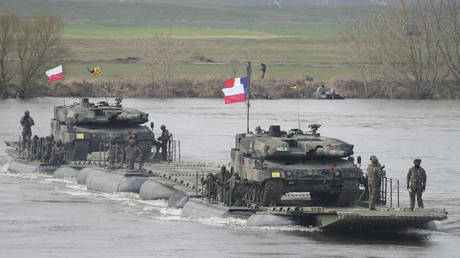 NATO ‘increasingly aggressive’ – Moscow
NATO ‘increasingly aggressive’ – Moscow
Moscow has repeatedly cited NATO’s continued expansion towards its border and the possibility of Ukraine becoming a member – which it has called an “instrument for confrontation” aimed at Russia – as among the main reasons for launching its military operation in February 2022.
Putin said last month that the conflict is an “existential” one for Moscow and a “matter of life and death,” while for the West it is simply a matter of “improving its tactical positions.”
The head of Russia’s General Staff, Valery Gerasimov, also stressed last year that Washington’s actions against Russia and its attempts to “save the Western-centric world order” have effectively made Europe less safe as a whole and turned it into an “arena for confrontation” with Russia.

